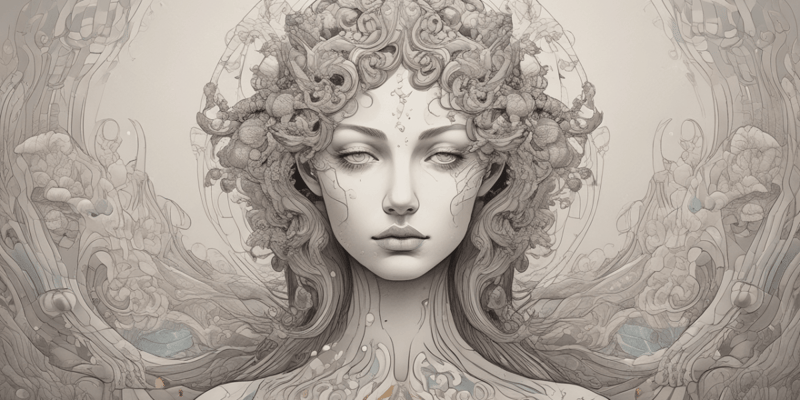10 Questions
Match the following characteristics with their corresponding episode type:
Grandiosity = Manic Episodes Increased irritability = Hypomanic Episodes Feeling worthlessness = Depressive Episodes Fast ideas and thoughts = Manic Episodes
Match the following characteristics with their corresponding episode type:
Distractibility = Manic Episodes Anhedonia = Depressive Episodes Increase energy = Hypomanic Episodes More talkative = Manic Episodes
Match the following characteristics with their corresponding episode type:
Insomnia = Depressive Episodes Decrease needs for sleep = Manic Episodes Increase in goal-directed activity = Hypomanic Episodes Psychomotor hypersomnia = Depressive Episodes
Match the following characteristics with their corresponding episode type:
Significant weight change = Depressive Episodes Fast ideas and thoughts = Manic Episodes Increased goal-orientated activity = Hypomanic Episodes Fatigue = Depressive Episodes
Match the following characteristics with their corresponding episode type:
Depressed mood = Depressive Episodes More talkative = Manic Episodes Increase energy = Hypomanic Episodes Grandiosity = Manic Episodes
Match the following symptoms with their corresponding episode type:
Grandiosity = Manic Episodes Increased irritability = Hypomanic Episodes Feeling worthlessness = Depressive Episodes More talkative = Manic Episodes
Match the following characteristics with their corresponding episode type:
Decrease needs for sleep = Manic Episodes Increase energy = Hypomanic Episodes Insomnia = Depressive Episodes Anhedonia = Depressive Episodes
Match the following symptoms with their corresponding episode type:
Fast ideas and thoughts = Manic Episodes Distractibility = Manic Episodes Increased goal-orientated activity = Hypomanic Episodes Psychomotor hypersomnia = Depressive Episodes
Match the following characteristics with their corresponding episode type:
Depressed mood = Depressive Episodes Increase in goal-directed activity = Manic Episodes Fatigue = Depressive Episodes More talkative = Manic Episodes
Match the following symptoms with their corresponding episode type:
Significant weight change = Depressive Episodes Increase energy = Hypomanic Episodes Fast ideas and thoughts = Manic Episodes Increased goal-orientated activity = Hypomanic Episodes
Study Notes
Manic Episodes
- Characterized by grandiosity, an inflated sense of self-importance
- Marked by a decreased need for sleep, often with little to no sleep required
- Increased talkativeness, with a rapid and pressured flow of words
- Experienced as a rapid flight of ideas and racing thoughts
- Distractibility, easily sidetracked and lacking focus
- Accompanied by a significant increase in goal-directed activity, often with a sense of urgency
Hypomanic Episodes
- Characterized by an increase in goal-oriented activity, with a focus on achieving specific tasks
- Often accompanied by increased irritability, becoming easily annoyed or frustrated
- Marked by a significant increase in energy levels, with a sense of restlessness and agitation
Depressive Episodes
- Characterized by a persistent and pervasive depressed mood, often feeling hopeless and helpless
- Accompanied by anhedonia, a loss of pleasure and interest in normally enjoyable activities
- Marked by significant weight changes, either gain or loss, often accompanied by changes in appetite
- Disrupted sleep patterns, including insomnia, with difficulty falling or staying asleep
- Psychomotor hypersomnia, excessive sleepiness and lethargy
- Feeling of fatigue, lethargy, and a lack of energy
- Accompanied by feelings of worthlessness, inadequacy, and low self-esteem
Manic Episodes
- Characterized by grandiosity, an inflated sense of self-importance
- Marked by a decreased need for sleep, often with little to no sleep required
- Increased talkativeness, with a rapid and pressured flow of words
- Experienced as a rapid flight of ideas and racing thoughts
- Distractibility, easily sidetracked and lacking focus
- Accompanied by a significant increase in goal-directed activity, often with a sense of urgency
Hypomanic Episodes
- Characterized by an increase in goal-oriented activity, with a focus on achieving specific tasks
- Often accompanied by increased irritability, becoming easily annoyed or frustrated
- Marked by a significant increase in energy levels, with a sense of restlessness and agitation
Depressive Episodes
- Characterized by a persistent and pervasive depressed mood, often feeling hopeless and helpless
- Accompanied by anhedonia, a loss of pleasure and interest in normally enjoyable activities
- Marked by significant weight changes, either gain or loss, often accompanied by changes in appetite
- Disrupted sleep patterns, including insomnia, with difficulty falling or staying asleep
- Psychomotor hypersomnia, excessive sleepiness and lethargy
- Feeling of fatigue, lethargy, and a lack of energy
- Accompanied by feelings of worthlessness, inadequacy, and low self-esteem
Manic Episodes
- Characterized by grandiosity, an inflated sense of self-importance
- Marked by a decreased need for sleep, often with little to no sleep required
- Increased talkativeness, with a rapid and pressured flow of words
- Experienced as a rapid flight of ideas and racing thoughts
- Distractibility, easily sidetracked and lacking focus
- Accompanied by a significant increase in goal-directed activity, often with a sense of urgency
Hypomanic Episodes
- Characterized by an increase in goal-oriented activity, with a focus on achieving specific tasks
- Often accompanied by increased irritability, becoming easily annoyed or frustrated
- Marked by a significant increase in energy levels, with a sense of restlessness and agitation
Depressive Episodes
- Characterized by a persistent and pervasive depressed mood, often feeling hopeless and helpless
- Accompanied by anhedonia, a loss of pleasure and interest in normally enjoyable activities
- Marked by significant weight changes, either gain or loss, often accompanied by changes in appetite
- Disrupted sleep patterns, including insomnia, with difficulty falling or staying asleep
- Psychomotor hypersomnia, excessive sleepiness and lethargy
- Feeling of fatigue, lethargy, and a lack of energy
- Accompanied by feelings of worthlessness, inadequacy, and low self-esteem
Learn about the characteristics of manic and hypomanic episodes, including symptoms such as grandiosity, decreased need for sleep, and increased talkativeness. Understand the differences between manic and hypomanic episodes.
Make Your Own Quizzes and Flashcards
Convert your notes into interactive study material.
Get started for free



